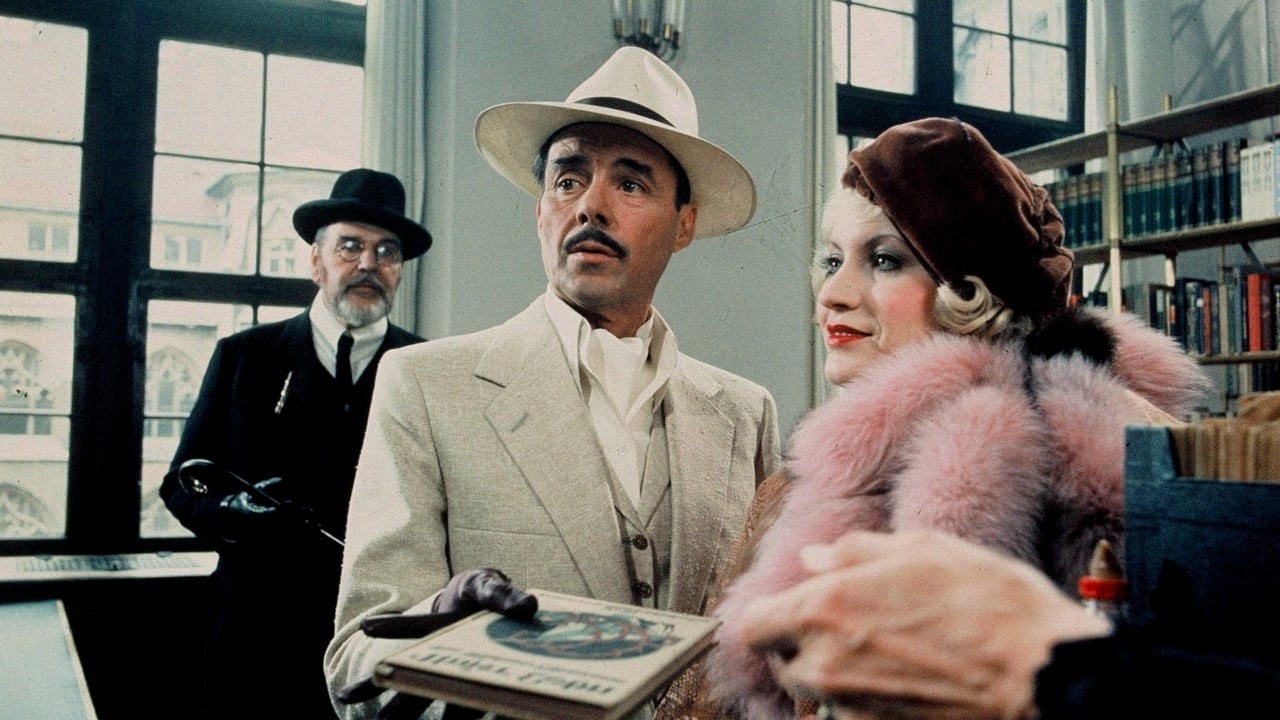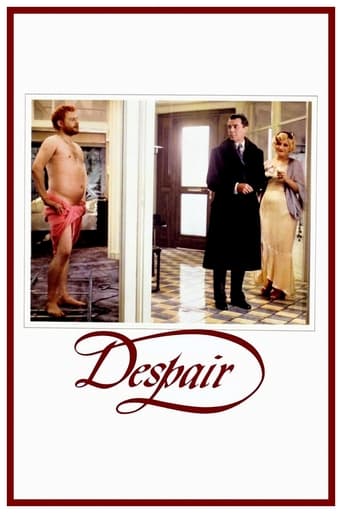

R.W.Fassbinder's first film with an international crew has in the German version the subtitle "Eine Reise Ins Licht" / "A Trip into the Light". If someone desires to know where this astonishing subtitle comes from, he usually gets the answer that Fassbinder meant Hermann Hermanns trip into the land of his release, and actually, the movie itself does little to prove that this assumption may be misleading: it shows pictures in which Hermann unifies with his wife Lydia at the border of the Brienzer- or Thunersee, they look like exactly the light-creatures at the Urdasee at the end of E.T.A. Hoffmann's "Medardus". However, these light-figures also switch, and we realize that Hermann Hermann is exchanged with his "double" Felix Weber whom he had chosen to kill because of his alleged similarity with Hermann in order to cash the insurance money that he was hoping to get from Orlovius because his chocolate factory is bankrupt.So far the outlines of the story. However, one of the most intriguing facts is that "Despair" can be watched in several quite different ways. Taken from outside, it can be seen as a movie about the Russian immigrant H.H., married to his stupid chocolate-binging wife L., having been always a stranger in Germany and going to loose now his company in the beginning of the Nazi era. While he is seriously brooding if the color of the chocolate has similarity with the Nazi uniform and whether the "bitterness" of his Pralinees fits to the Tausendjähriges Reich, he starts to see himself while he is having sex with his wife. In the cinema he sits behind himself, and the movie brings him to the fatal idea to escape bankruptcy by entering a life policy and kill his Doppelganger. However, Hermann does not realize anymore that the man whom he sees, i.e. his real Doppelganger, does not exist outside of his projective brain, he goes out and meets the fairground man Felix who has nothing in common with himself but who is considered by Hermann as his twin-brother.From this point in the movie on, Hermann Hermann starts his "Trip into the Light", and more and more the audience should become clear, that the use of the word "light" by Fassbinder has nothing to do with the usual metaphoric sense of "light" in the sense of "releaf", but is changed into his opposite. Moreover, Fassbinder uses the light here in addition also in a concrete sense, insofar as he shows the place where Hermann's trips ends as a brightly illuminated Swiss Alpine mountain village. This is by the way programmed: We see a picture of the very same village already at the beginning of the movie, it hangs on the wall in the restaurant, where Hermann and Orlovius meet for the first time. The contradiction to the comforting light in the long tradition from the Bible to Bonaventura becomes now suddenly brutally perverted, when we see Hermann at the end more or less imprisoned in his small, dark hotel room with closed shades, sitting at the edge of his bed like a parcel ready to be picked up and telling the police which is coming to arrest him that he is just an actor and will get out of here.Finally, we realize that Fassbinder has created with "Despair" a gigantic anti-Bonaventuran Metaphysics of Darkness, his light being the misleading light at the end of the tunnel which Hermann enters at last when he sees himself doubling his individuality. Only in this interpretation of the light as negative pol, but in no ways in the literal interpretation of the light as positive pole, we understand why "Despair" is dedicated to Antonin Artaud, Vincent van Gogh and Unica Zürn, who all ended their light by suicide, thus traditionally spoken in darkness and not relieved by the light of god who explicitly forbids self-killing. The famous sunflower-fields of Van Gogh, the strenght of the theater of cruelty and the opium-illuminations of Artaud, the Zürn's anagrams by aid of which she pressed sense out of combinatorics --- they all are witnesses of a revolutionary new paring of light with the ethical category of Bad and of darkness with the ethical category of Good, and thus the subversion of the logical and ethical correspondences. Was Fassbinder inspired by an often overseen sentence in Unica Zürn's main work "The Man in the Jasmin": "And then I jumped into the light and started to watch myself"?
... View MoreAs the owner of a chocolate factory, Hermann Hermann (Dirk Bogarde) enjoys all the luxury of a high-style bourgeois life, but in reality, it shows up merely as a facade, because his factory stays before bankruptcy, and his wife Lydia (Andréa Ferréol) has a liaison with her brother-in-law, the painter Ardalion (Volker Spengler). Hermann Hermann starts to doubt everything, and eventually he realizes, that this bit of life, that lies still before him, will be wasted in any case to a hopeless struggle against these doubts. His meeting with the sleeping hobo Felix Weber (Klaus Löwitsch) as a picture of the death can be seen as birth of the idea to stage a sudden accident, in order to cash a high sum of insurance money. In exchanging his outer appearance, Hermann Hermann believes to be capable of transcending the borders of his life and to be able to start a new one. Hermann Hermann has a totally emotionless relation to the death, because it is the death of the other and for him a necessary act to commence a new life. The radical moment lies in the fact of the penetration into another life, whose border to one's own life is a big as the border between the Here and the Beyond.The whole movie is characterized by objects and persons, who have their counterparts and mirror images, respectively. For Fassbinder, glass walls were borders, through which one could look through form the one side and which were opaque from the other. While the mirrors in Nabokov's novel stay opaque, Fassbinder creates with his glass labyrinths transparency, allows the sight into the Beyond, and dissolves the hermetic presentation. "Despair" produces a visual bridge between the two worlds: In Fassbinder's film, the borders between the Here and the Beyond start to merge into one another, while Nabokov underlines the closeness of both worlds. Not only is Hermann Hermann himself observing subject, but he is also the object of observation. In view of this perception, the world, in which there is no border anymore between subject and object turns strange and menacing. With the disappearance of the projected Ego also the process of self-dissolution announces itself, that ends with the real Ego being at the end not anymore identical to itself and the dissociation of the personality being complete. But Hermann Hermann's plan fails, because his fatal idea of the similarity between him and Felix Weber is at last the product of his sick fantasy. The hero is becoming the victim of his own deformed perception. Sitting in a hotel room, he finally writes his own story. At the end, the "trip into the light", as the German title of the movie is named, ends with the darkness of Hermann Hermann's mind in a bright Alpine mountain village, when he gets fully insane and considers the reality to be a movie, whose director he is and whose acting he is able to control.There can be no doubt, that this is not only Fassbinder's best movie, but one of the top ten movies made ever. Rating: 10 Points.
... View MoreShot in English on a budget that nearly equaled the cost of his first fifteen films, Rainer Werner Fassbinder's Despair has wit and style yet its attempt to recreate the dark, comedic genius of Vladimir Nabokov left me unmoved and uninvolved. Based on Nabokov's novel Despair (apparently intended as a parody of Dostoevsky), and adapted for the screen by Tom Stoppard, the film describes the descent into madness of wealthy chocolate entrepreneur Hermann Herman (Dirk Bogarde). Set in Germany on the eve of the Third Reich, scenes of the Nazis assaulting Jewish-owned businesses are sprinkled throughout the film but to no apparent purpose. Herman has left his Russian home to live in Berlin and constantly fantasizes about the beauty of the Russian winters and whispers `Russia, which we have lost forever...' to his wife, Lydia (Andrea Ferreol). He is a thoroughly unsympathetic character: cold, calculating, and cynical and Mr. Bogarde's exaggerated mannerisms do not make him any easier to appreciate. Much of the film takes place inside Herman's stately bourgeois home. Shots of the characters through glass partitions keep the viewer at a distance and the elegant interiors look like an abandoned mausoleum. Lydia's and Herman's relationship is unconvincing and Fassbinder's repeated descriptions of Lydia as an unintelligent sex object border on misogyny. "The flowers of your sensuality would wilt with intelligence," Herman tells his wife whom he always addresses with condescension. In addition to Lydia, we gradually meet other vivid supporting characters: Lydia's cousin, Ardalion; and Dr. Orlovious, an insurance salesman whom Herman mistakenly thinks is a psychiatrist and opens up to. Herman is convinced that Felix Weber (Klaus Lowitch), a laborer, resembles him as closely as "two drops of blood." though the resemblance is tentative at best (a joke Nabokov wisely saved for his readers until the end of his novella). He has an odd compulsion to observe himself as a stranger and devises a plan to commit the perfect crime, exchanging identities with the worker as a means of escaping his existence. Felix, on the other hand, decides to humor the eccentric Herman with the thought of getting a job. In Despair, Fassbinder constructs a world in the process of falling apart where people march inexorably toward self-destruction and where the journey into light proves to be an illusion. In a world approaching madness, however, Hermann seems to fit perfectly -- no more, no less crazy than the insanity occurring around him.
... View MoreIt's hard for me to stay away from excessive use of superlatives when commenting on what I consider to be Fassbinder's masterpiece. Michael Ballhaus has filmed more than a dozen Fassbinder films, and Despair is a fine example of the value of their collaboration. Several images are stunningly memorable: the water dripping on the eggshells in the sink; the circular tracking shot through the glass walls of Hermann Hermann's office revealing him in his cage; and the auto-voyeurism of Hermann watching himself in bed with his voluptuous, vacant Frau. Doing justice to Nabokov's compelling dialog and canny character studies has been well done before in Kubrick's Lolita, but Tom Stoppard's rendition here was a perfect match for Fassbinder's (and Ballhaus's) visual feast. And if you are somehow not yet a fan of Dirk Bogarde, seeing his performance in Despair will surely make you as ardent an admirer of his work as I have become.
... View More